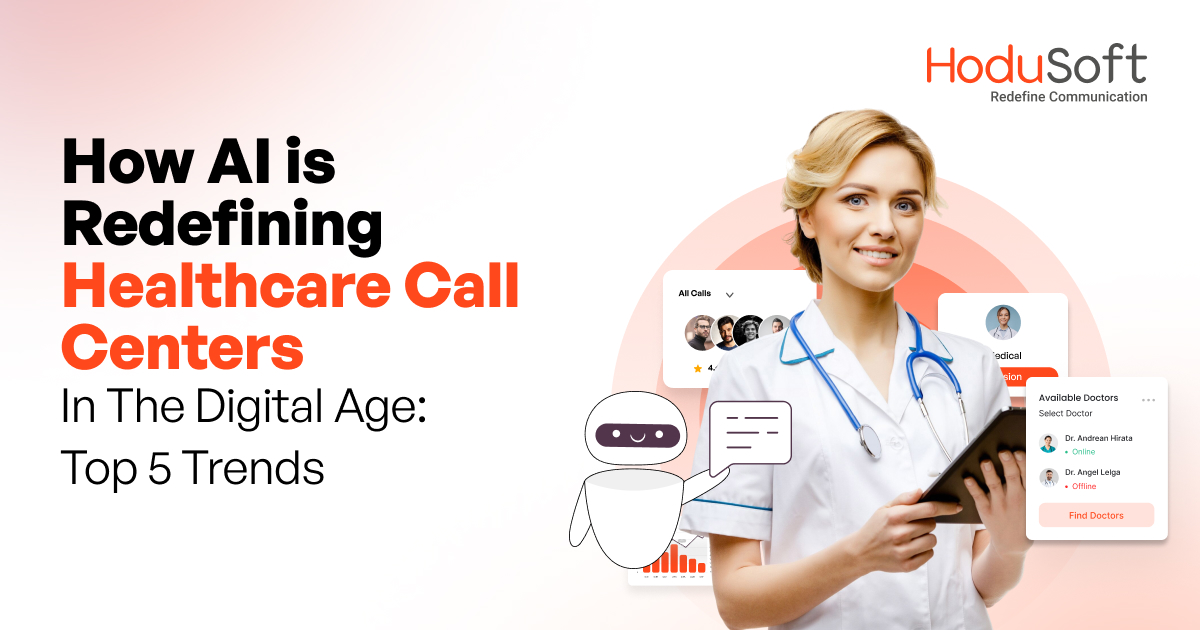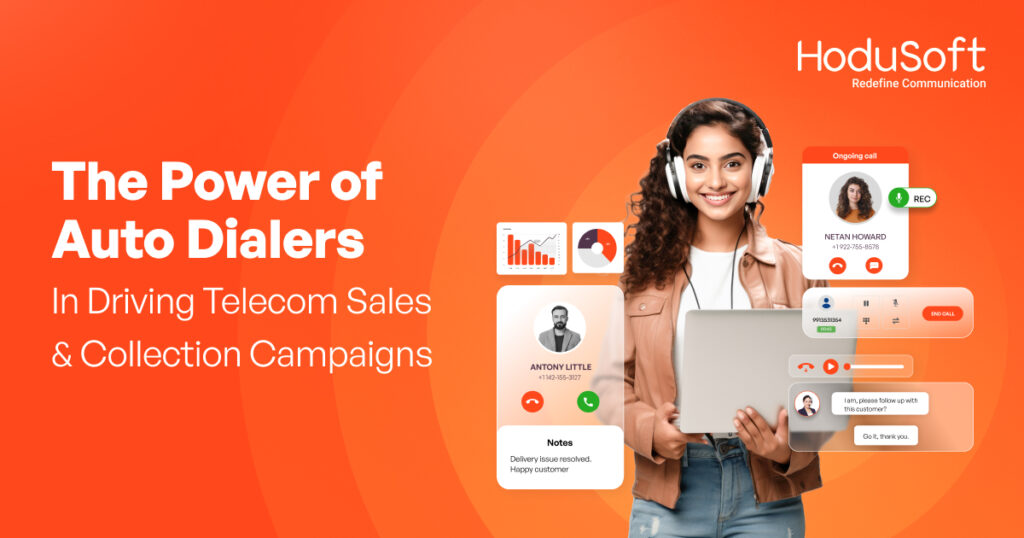How AI is Redefining Healthcare Call Centers in the Digital Age: Top 5 Trends
The advent and growing popularity of generative artificial intelligence (AI) has changed the face of the healthcare sector.
As noted technocrat Benjamin Bell, “Al will not replace doctors, but instead will augment them, enabling physicians to practice better medicine with greater accuracy and increased efficiency”
As another quote of renowned surgeon and writer Dr Atul Gawande said, “‘What we are seeing is that AI will not replace doctors, but a doctor who does not know how to use it.”
However, it’s not just doctors and healthcare professionals who will need to leverage AI. Instead AI is also indispensable in customer service.
Healthcare organizations can never neglect their emergency equipment such as ambulances, defibrillators, oxygen cylinders, to just name a few. How can they overlook their communication systems?
At HoduSoft we know the importance of sophisticated communication systems for healthcare organizations. We have engineered our HoduCC call center software solutions to simplify patient interactions and improve response times.
In this blog post we have discussed the key communication challenges healthcare organizations face, why AI is indispensable for healthcare organizations, and the top 10 trends AI is redefining healthcare call centers.
If you are a professional in the healthcare sector, this blog post is just for you. Read on and thank us later.
Top Communication Challenges Healthcare Call Centers Face
From high call volumes to long wait times, healthcare call centers face a wide array of communication challenges. Here are some of those.
1. High Call Volumes
Would you be surprised to know that a majority of organizations in the healthcare sector (if not all) face huge call volumes? No doubt, during pandemics, flu season, and emergencies the call volumes reach an unprecedented level. However, during regular days also, the call volumes are also high. Be it booking appointments for regular checkups or asking queries about insurance coverage for various treatments, the call volumes don’t stop come rain or shine. When healthcare providers are unable to manage call volumes, it results in long wait times.
2. Need for 24/7 Availability and Prompt Response
When the call volumes are huge, which is more often than not, then providing prompt response becomes a challenge. That’s why it’s important for healthcare professionals to make sure that they are available round-the-clock so that they can provide prompt response to callers. However, a lot of healthcare call centers aren’t equipped to handle queries 24 hours a day, seven days a week, and 365 days in a year. The support of a lot of healthcare services providers reduces during nights and weekends.
3. Data Security and Privacy Concerns
Healthcare call centers handle a huge volume of sensitive patient data. It ranges from personal health information to billing records. But when it comes to providing data security, many healthcare services providers find it difficult to keep up. In the age of digital transformation, the stakes are higher. A little gap in security can compromise entire patient data. It can result in lawsuits, lost trust, broken systems.
4. Limited Use of AI and Automation
Many healthcare companies don’t use Artificial Intelligence (AI) tools and automation. This hinders operational efficiency and results in too many manual, repetitive, and routine tasks. The lack of AI technologies and AI tools also means total dependence on manual processes and live agents for all queries. That not only results in slower response times and inefficiencies in handling simple queries, but it also increases operational costs.
5. Training and Retaining Skilled Staff
In the healthcare sector, workforce quality matters a lot. Healthcare professionals need to be highly skilled and trained. However, in many healthcare organizations employee turnover is high. It could be due to burnout, stress, inadequate career progression, or some other reasons. In such instances, it can affect healthcare operations, service continuity, as well as service quality. If any healthcare providers find it difficult to train and retain skilled staff, they may struggle to deliver desired patient care.
6. Handling Diverse Patient Needs
In the healthcare sector, call centers stand at the front lines. One call could be radically different from the other. One call could be about chronic disease management. The other could be a medical emergency. The patient needs and patient care could be diverse in both cases. But the stakes are high. To effectively handle such diverse needs and ensure better patient outcomes, healthcare call centers must address a wide variety of patient issues, including chronic diseases, mental health, and urgent care.
7. Managing Multichannel Communication
Patients don’t just call anymore. They send text messages. They interact over live webchats. They send emails. They engage on social media. Healthcare organizations need more than phones. They need smart, integrated digital platforms. That’s how they can fuel patient engagement and improve the patient experience. This is what digital transformation looks like. No matter whichever channel is used, the response of healthcare systems is instant.
8. Compliance with Healthcare Regulations
Compliance with all relevant domestic and international regulations is a must for healthcare organizations. That necessitates constant updates in process, protocol, and tech. But do all comply with the key regulations such as Health Insurance Portability and Accountability Act (HIPAA), General Data Protection Regulation (GDPR), and more? Unfortunately, some of them don’t. Any breach or non-compliance can result in heavy fines and a loss of patient trust.
9. Inconsistent Patient Experience
Today’s patients don’t just want effective treatment and improved patient outcomes from healthcare professionals. They also want to be treated as humans. They want to be heard. But many healthcare organizations lack the mechanisms to deliver the desired experience to patients. The lack of personalization and contextual knowledge results in fragmented interactions. As a result the patient experience suffers and feels broken. It feels disconnected, like no one’s really listening.
10. Limited Adoption of Remote Monitoring and Virtual Tools
In the healthcare industry, speed matters. A difference of a few seconds can mean the difference between life and death. That’s why remote patient monitoring and virtual care are extremely beneficial for improving patients outcomes. However, many healthcare organizations are stuck in the past. Many of them don’t leverage remote monitoring to lighten hospital loads. Many of them don’t use digital solutions to reach the ones who can’t come in. Several healthcare call centers haven’t fully embraced remote monitoring or virtual support.
Why is AI Indispensable for Healthcare Call Centers?
AI has proven to be a game changer for the healthcare sector. It brings a wide array of benefits starting from reduced wait times to enhanced support and personalized care. Here are some reasons AI is necessary for contemporary healthcare organizations.
1. Faster Response Times and Reduced Waits
AI in healthcare is changing the game. It’s part of the broader digital transformation that’s pushing hospitals and clinics toward greater operational efficiency and better care. AI-powered systems triage faster, route smarter, and reply instantly. The result is a smoother patient experience and higher patient satisfaction.
2. 24/7 Availability and Support
AI technologies have made round-the-clock support a reality in the healthcare industry. When humans rest, AI listens and acts. It’s there at midnight, on holidays, during storms. With AI systems such as chatbots and virtual agents, patients no longer have to wait for working hours to get answers. This constant presence drives stronger patient engagement and reshapes the delivery of healthcare services.
3. Personalized Patient Interactions
By analyzing patient history, behavior, and preferences, AI delivers support that feels human, relevant, accurate, and empathetic. This is the heart of personalized medicine and personalized care. Patients feel heard. Their needs come first. The result is a better patient experience and, more importantly, better patient outcomes.
4. Improved Diagnosis and Triage Support
In the healthcare industry, speed and accuracy can save lives. AI technologies use predictive analytics and vast pools of medical data to help healthcare professionals spot symptoms early and prioritize urgent cases. With AI guiding the process, patient outcomes improve and care becomes smarter, not just faster.
5. Seamless Integration with EHR and Health Systems
AI in healthcare makes information flow easier. During calls, it pulls electronic health records in seconds, giving agents access to real patient data when it matters most. It scans healthcare data, spots patterns, and offers insights without delay. AI facilitates smoother access to and analysis of health records during calls.
6. Data-Driven Decision Making
AI systems bring clarity to healthcare operations. With powerful data analytics, call centers can spot trends, predict needs, and make smarter choices about staffing, training, and workflows. For healthcare leaders, this means fewer assumptions and more action based on real insights.
7. Ensuring Compliance and Security
In the healthcare sector, trust is everything. AI in healthcare helps guard it. It monitors calls for compliance, spots red flags, and protects sensitive patient data with precision. By scanning healthcare data in real time, AI strengthens data security and keeps mistakes from slipping through.
8. Managing Chronic Conditions with Smart Monitoring
AI technologies are changing chronic disease management for the better. By working alongside remote monitoring tools, AI keeps a close eye on patients around the clock. It tracks vital signs, flags issues, and sends alerts before problems grow. This kind of remote patient monitoring helps healthcare providers act faster and deliver more consistent patient care.
9. Handling High Volumes with Ease
In the fast-paced healthcare industry, huge call volumes can be overwhelming. But with AI systems, handling high volumes of calls becomes a cakewalk. AI can handle thousands of calls, messages, and queries at once. AI brings unmatched operational efficiency and helps healthcare professionals stay focused on care, not chaos.
10. Enabling Proactive Care and Better Outcomes
AI in healthcare doesn’t just react, it predicts. By using historical data and behavioral patterns, it spots what’s coming and acts before problems grow. This kind of predictive analytics leads to timely care, fewer complications, and improved patient outcomes. For healthcare leaders, it’s a path to better patient outcomes, stronger health outcomes, and a future where patient care is always one step ahead.
Top 5 Trends in Healthcare Call Centers
In the age of AI, the traditional call center technologies won’t be adequate. AI-powered tools aren’t just upgrades, they’re essentials. Healthcare call centers need to leverage the right tools to improve patient outcomes and stay one step ahead. Here are the top five trends that are shaping the future of healthcare communication.
1. 24/7 Intelligent Virtual Assistants
One of the best things about AI-powered call center solutions is the round-the-clock capability it offers. As discussed in the challenges, it’s not uncommon for healthcare organizations to receive calls for medical emergencies at any hour of the day or night. And healthcare organizations need to be on their toes at all hours, be it the dead of the night or in the wee hours of the morning. That’s precisely where 24/7 virtual assistants come in. They enable healthcare services providers to be on their toes round the clock.
2. Predictive Call Routing
Predictive analytics is changing how healthcare call centers work. AI systems now analyze caller behavior, past interactions, and health needs in real time. With this data, artificial intelligence routes each call to the most qualified healthcare professional without delay. The result is better patient experience and greater operational efficiency. In a fast-moving healthcare industry, smart routing isn’t a luxury. It’s essential.
3. Real-Time Sentiment Analysis
Artificial intelligence now listens for more than just words. With natural language processing, AI technologies can detect tone, stress, and emotion during a call. This helps healthcare providers understand how a patient feels, not just what they say. It leads to more empathetic responses and improves overall patient care. As a result, patient satisfaction increases, and the healthcare professionals on the front lines are better equipped to respond in real time.
4. Intelligent Appointment Scheduling
AI tools are making appointment scheduling faster and smarter. With the help of advanced AI technologies, healthcare operations can now automate bookings, send reminders, and reduce no-shows. This improves patient outcomes by ensuring timely care without the usual delays. It’s a key step in the digital transformation of healthcare administration. AI systems not only save time for both patients and providers but also keep schedules full and efficient.
5. Omnichannel Integration
People are no longer confined to voice calls alone. They can connect over email, text messages, instant messages, chat, video conferencing, social media, and more. Healthcare organizations must provide omnichannel support for patients. AI is making that possible. It brings all communication into one seamless system. Healthcare providers no longer struggle with fragmented tools. Instead, they operate through connected healthcare systems that boost operational efficiency.
Final Words,
From easing the load on healthcare professionals to giving patients faster, more personal care, AI is changing how healthcare call centers work. For the healthcare industry, AI is no longer a luxury or experiment. It’s a necessity.
AI tools and technologies not only can help healthcare organizations overcome various communication challenges but also help them enhance their operations. In today’s time, the message is simple—adapt with AI or fall behind.
At HoduSoft, we believe great care begins with clear communication. That’s why our HoduCC call center software is built to help healthcare organizations stay ahead with speed, intelligence, and heart.
If you are looking for the right AI-powered call center solutions for your healthcare organization, then you can check out the offerings we have to offer. Contact us today to book a free demo.



